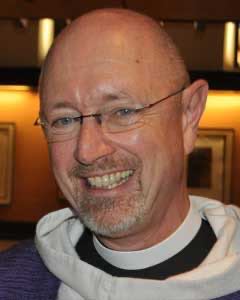MAYBE IT’S JUST by chance that the paper has opened to this page and you are reading this review. Maybe you prayed that if God wanted you to see Oscar and Lucinda, then there would be a sign – like a review in this month’s Anglican Journal. If you have ever asked God to confirm a direction or decision by a sign, then you are ready to see director Gillian Armstrong’s film version of Peter Carey’s Booker prize-winning novel, Oscar and Lucinda.
This is a film about faith and temptation: Oscar (played by Ralph Fiennes) is a mid-1800s Church of England clergyman who is addicted to gambling. Whether it’s heads or tails, or the outcome of a horse race, or a hand of cards, he loves to figure it out, make a guess, and gamble. Oscar’s fascination with gambling begins when, as a child, he seeks a sign from God. He asks God to strike his father if he is not to follow his father’s directions. When his father appears with a gash in his leg, Oscar knows he’s on to something.
Convinced that he must leave the Plymouth Brethren, he draws a quadrant on a rock with the names of four denominations, seeking God’s will for where he should locate himself. He throws a rock over his shoulder and it lands on the Anglican square. Not pleased with this result, he throws the rock again and again: “Anglican, Anglican, Anglican.” So he leaves home, finds refuge in the rectory of the local Anglican priest and begins his journey towards ordination. It is while he is at seminary that he discovers gambling, and uses his considerable winnings at horse races to fund his education, giving to the poor anything he does not need.
The newly ordained Oscar meets Lucinda (played by Cate Blanchett) aboard a ship sailing from England to Australia. She seeks him out to confess that she is a compulsive gambler. Unable to keep his composure as she confesses her sin that is his as well, Oscar explodes with glee and, drawing from the philosophy of Pascal, argues that the whole enterprise of faith is a gamble – “We bet that there is a God, we bet our life on it!” It is when they land in Sydney that their lives take unexpected turns, leading to the construction of a glass church and the journey with the church to a small remote village in the Australian outback.
To reveal the conclusion of this film would be to spoil it. Suffice it to say that, after a horrendous overland journey, the glass church reaches its destination and Oscar and Lucinda’s lives are inexorably joined together – but not in a way that either had imagined.
Ralph Fiennes disappears into the role of Oscar – he presents a childlike wonder at the world and a simple but powerful faith. Cate Blanchett is a delightful Lucinda – energetic, independent, strong and zany.
The story of the film is enough to keep you engaged, but the imagery is what stays with you and haunts you. The glass church floating down the river with Oscar inside makes a powerful picture. Beautifully photographed, it links together two archetypal images: church and water – and becomes a symbol of the church then and now. For in many ways, the church is transparent: people look to the church not so much to see buildings but how the lives of church members are shaped and changed by what the church believes. Often less than impressed with what they see, many dismiss the church as a bunch of hypocrites.
But Oscar and Lucinda invites you to reflect on the whole enterprise of faith, the search for signs, and the role of coincidence. It imagines that the purposes of God are deeper and more complex than we can know and that God can work through even our folly and sin to bring about new life and hope.
So whether you’re someone who has, at some time in your life, opened a Bible seeking God’s purpose for you, or someone who doubts the existence of God, you will find, in Oscar and Lucinda, a memorable and unsettling account of one man’s journey to his destiny. Quirky and offbeat, Oscar and Lucinda will delight and disturb all who come in contact with this story and give lots of food for thought for those attracted to the risk of faith.
Peter Elliott is dean of Christchurch Cathedral, Vancouver, and a member of the board of directors of the Vancouver Film Festival.




